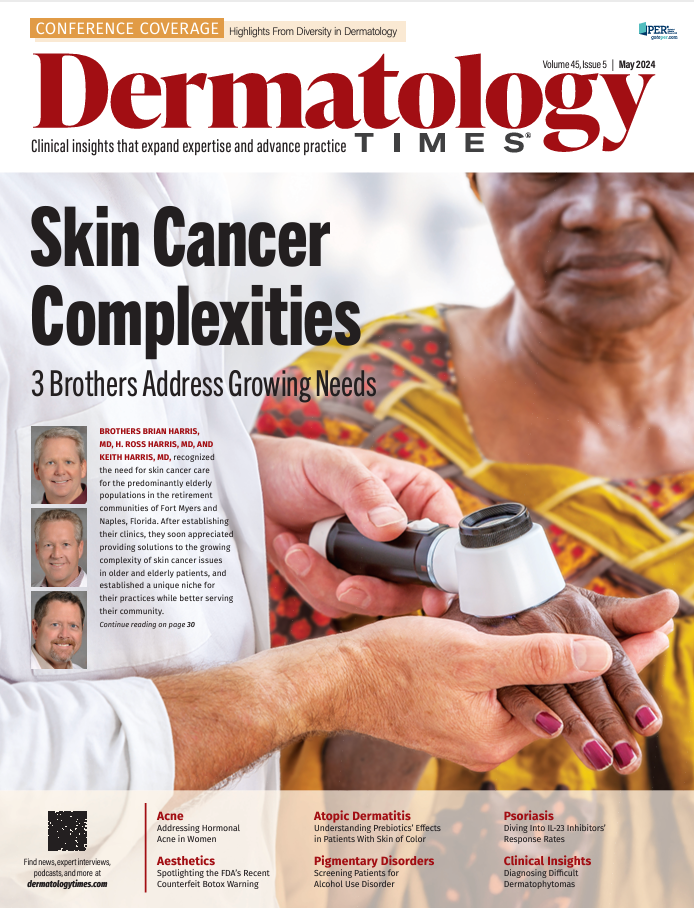- Acne
- Actinic Keratosis
- Aesthetics
- Alopecia
- Atopic Dermatitis
- Buy-and-Bill
- COVID-19
- Case-Based Roundtable
- Chronic Hand Eczema
- Drug Watch
- Eczema
- General Dermatology
- Hidradenitis Suppurativa
- Melasma
- NP and PA
- Pediatric Dermatology
- Pigmentary Disorders
- Practice Management
- Precision Medicine and Biologics
- Prurigo Nodularis
- Psoriasis
- Psoriatic Arthritis
- Rare Disease
- Rosacea
- Skin Cancer
- Vitiligo
- Wound Care
News
Article
Dermatology Times
Pearls From the Diversity in Dermatology Conference
Author(s):
Discover pearls on caring for patients with STDs, using dermatopathology in SOC, managing inflammatory skin conditions in women, and ensuring patients are able to access care needed.
The 2024 Diversity in Dermatology conference held March 21 to 24 in San Antonio, Texas, provided attendees with a targeted educational opportunity that focused on various aspects of diversity within dermatology.
The 4-day CME conference covered specialized topics such as caring for patients with skin of color, cultural competency, women empowerment, dermatologic care for members of the LGBTQIA+ community, and more. While the conference only lasted 4 short days, the information presented remains crucial in ensuring equitable dermatologic care for all patients.
Dermatology Times spoke with conference faculty and presenters to discuss pearls and lessons learned from the meeting, including caring for patients with sexually transmitted diseases (STDs), using dermatopathology in skin of color, managing inflammatory skin conditions in women, and ensuring patients are able to access the care and treatments they need.
Destigmatizing STDs
Amy Spizuoco, DO, FAOCD, is a dermatopathologist and dermatologist in New York, New York, as well as the owner and founder of True Dermatology, the past president of the American Osteopathic College of Dermatology, and an associate professor at the Icahn School of Medicine at Mount Sinai in New York, New York. Spizuoco spoke at 2 sessions at the conference, one of which was titled “The Story Behind STDs.”1
Spizuoco shed light on the misconceptions and stigmas surrounding STDs, particularly within diverse communities. She emphasized the importance of educating both health care providers and patients about the prevalence of STDs across all demographics and the necessity of accurate testing and diagnosis to combat stigmas effectively.
“Everyone is at risk of getting an STD, not particular groups or individuals based on sexual preference,” she said.
Dermatopathology in Diverse Populations
Spizuoco’s other session, “Everything You Need to Know About Dermatopathology and the Dermatopathologist,”2 delved into the role of dermatopathology in diagnosing skin diseases in diverse patients. Through biopsy and microscopic analysis, dermatopathologists can provide precise diagnoses, differentiate between various pathogens, and determine the appropriate treatment strategies. Recent advancements in dermatopathology techniques, including specialized stains and immunohistochemical analyses, have significantly enhanced diagnostic accuracy and patient care outcomes.
Spizuoco highlighted the significance of fostering a sensitive and empathetic environment within health care practices, ensuring that patients receive personalized and respectful treatment regardless of their cultural or social identities.
Steering From Paternalistic Medicine
Mona Shahriari, MD, FAAD, is an assistant clinical professor of dermatology at Yale University School of Medicine in New Haven, Connecticut, and the associate director of clinical trials at Central Connecticut Dermatology Research. Shahriari spoke at 2 sessions, “Being Sensitive in an Inclusive Environment”3 and “Special Considerations of Treating Inflammatory Skin Disease in Women.”4
Shahriari underscored the importance of clinicians acknowledging their biases and assumptions, fostering an environment where patients feel heard and respected to build trust and enhance treatment adherence.
When treating women with inflammatory skin conditions during their childbearing years, Shahriari highlighted the importance of discussing family planning and contraception as integral components of treatment regimens, considering the potential impacts of uncontrolled inflammation on both the mother and the unborn baby. Shared decision-making emerged as a fundamental aspect of navigating treatment options, ensuring that patients are empowered to make informed choices aligned with their preferences and health needs.
“You want to continue to have conversations about family planning with all women of childbearing potential who are receiving any therapy, whether it’s systemics for inflammatory skin disease, systemics for acne, because 50% of all pregnancies are unplanned, and 80% of patients don’t tell their provider when they’re trying,” she said. “It’s really important to just have those ongoing conversations so patients are aware that there are options out there. If they flare, they should go off certain medications at certain time points. This way, the patient can feel like they have the right knowledge to make the correct decision.”
Overcoming Hurdles in Care
Shanna Miranti, MPAS, PA-C, is a board-certified physician assistant at Riverchase Dermatology in Naples, Florida, and Dermatology Times’ summer editor in chief. Her session, “Conquering the Denial Hurdles—Getting Your Patient on the Right Drug,”5 explored the nuances of helping patients access the latest therapies. This access may be hindered due to new processes for specialty medications and prior authorization forms.
“Patients often wait weeks to months to come see us, and they will be paying a specialty co-pay often to see us in our practices. So, we should not just offer our patients generics that have been around for 20, 30, or 50 years, or generics that they may have already tried and failed previously with their primary care physician,” she said. “I think as dermatology providers, we need to remember to actually kind of familiarize ourselves with patients’ formularies.”
References
- Spizuoco A. The story behind STDs. Presented at the 2024 Diversity in Dermatology conference, March 21-24; San Antonio, TX.
- Spizuoco A. Everything you need to know about dermatopathology and the dermatopathologist. Presented at the 2024 Diversity in Dermatology conference, March 21-24; San Antonio, TX.
- Shahriari M. Being sensitive in an inclusive environment. Presented at the 2024 Diversity in Dermatology conference, March 21-24; San Antonio, TX.
- Shahriari M. Special considerations of treating inflammatory skin disease in women. Presented at the 2024 Diversity in Dermatology conference, March 21-24; San Antonio, TX.
- Miranti S. Conquering the denial hurdles—getting your patient on the right drug. Presented at the 2024 Diversity in Dermatology conference, March 21-24; San Antonio, TX.

































